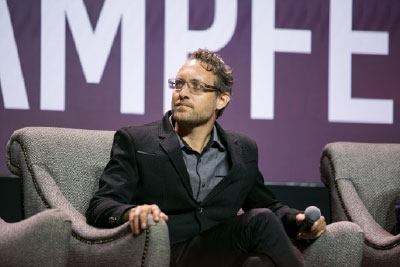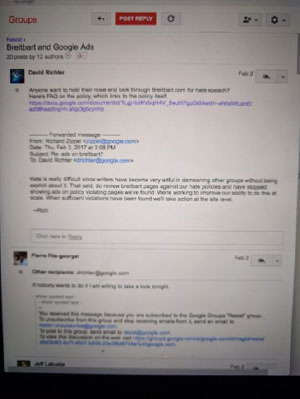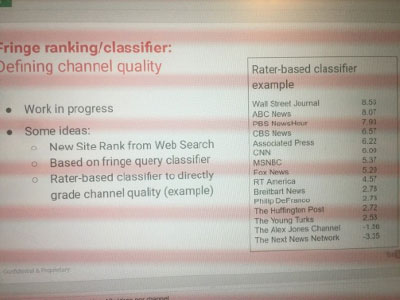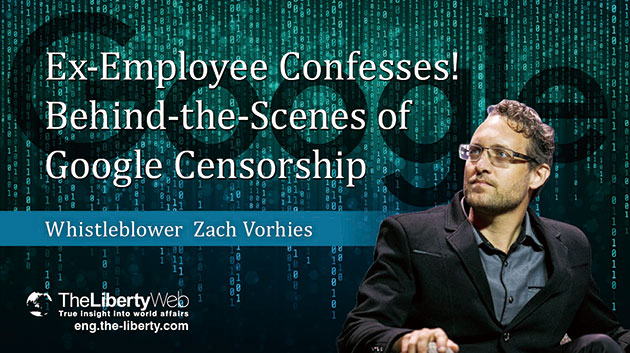Ex-Employee Confesses! Behind-the-Scenes of Google Censorship
Google Restricts Freedom of Speech, Violates Antitrust Laws【Part2】
An interview with an ex-employee who, after witnessing Google’s censorship, submitted nearly 1,000 internal documents to the U.S. Department of Justice’s Antitrust Division.

Zach Vorhies
Software Engineer. Worked at Google until 2019.
――You have released nearly 1,000 of documents describing Google’s censorship regime, and this whistle-blowing created a major impact on people in Washington. Especially, there are many republicans who are concerned about Big Tech’s censorship, like Senator Ted Cruz. Did you get any reaction from those politicians or government officials?
Vorhies: Yes. Senator Ted Cruz is an ally. We’ve been working with him to help with the questions that he’s trying to ask. Specifically, what Google’s page rank is on websites and individuals. And they have been asking Google what the page rank is, and Google refuses to give the page rank for websites. They will ignore this question. They will beat around the bush regarding this question. They will not answer the question. And the reason why is because if people see what the page rank is, that’s going to be a very uncomfortable answer for Google. And it’s going to lead to more questions. And the crux of the entire ranking of the internet is Google’s secret page rank score that they have for each website that exists on the internet.
The page rank score on each website reflects what Wikipedia has to say about that website. The score is broken down into three categories: expertise, authoritativeness, and trustworthiness. And the way that Google has instructed its employees to rank every website is that they tell them to go and see what Wikipedia has to say about that website or the person or the topic. For example, if you go to The New York Times and you look at the Wikipedia page, you will see that Wikipedia says very nice things about The New York Times. Now for those of us that are the common people, it’s very clear that The New York Times is the enemy of the United States. But unfortunately, the page rank for this website is very high. And therefore, the articles that are pushed out by The New York Times are ranked highest and are returned in search results. That’s Google Search, Google News, and YouTube. I’m sure that there is equivalence in Japan that is being downranked and possibly websites that are pro-globalist, that are against the Japanese people, are being ranked high. The reason why this is happening is because those websites have a high page rank score because of what Wikipedia has to say. And I recommend that the Japanese government use the courts and force Google to answer what the page rank score is for the various news outlets that they’re having problems with.
Part of the documents that Mr. Vorhies released.

There are group chats within Google that debate whether certain sites can be “censored for hate speech.”

In a certain presentation note, an example of scorekeeping was discussed in which the search result ranking of sites with “non-mainstream” opinions would be lowered.
――In 2010, Google withdrew from China by saying it is no longer willing to censor search results on its Chinese service. Could you tell us what made Google transform from anti-censorship to pro-censorship?
Vorhies: It all happened when Donald Trump won the election in 2016. And within one week of Donald Trump winning the election, they had a company-wide meeting. And they talked about how they were personally offended at the election of Donald Trump, and that they hoped that populism and nationalism would be a blip in history. Towards the end of the conversation, there was a question asked by the audience about what some of the most successful things that Google had done during the election. And the CEO of Google answered that the most effective thing that Google had done during the election was to censor the fake news using machine learning. This is when I decided that I was going to determine what exactly Google meant by fake news. And then I investigated as a full-time employee and found out that the definition of fake news, the examples that they were using, all had to do with Hillary Clinton. And that’s when I realized that this may not be about fake news but about controlling the political landscape.
It was stunning to me. And I didn’t want to believe that because I had been working at the company for five years at that point and I didn’t believe that Google would censor anything. In fact, the mission statement of the company is to organize the world’s information and make it universally accessible and useful. And this is still the mission statement of the company to this day. And that’s the reason why I started investigating what fake news was and when I found out what they were defining fake news as, I realized that there must be a censorship system that would effectively do this censorship. And I found it. The name of this project was called machine learning fairness and you could think of it as AI censorship. You might have heard of a project called Project Dragonfly. As far as I know, Project Dragonfly is fake. I’ve never seen any hint that it even exists within Google. There’s no evidence, but I see a huge body of evidence that exists for machine learning fairness. In fact, it has subcomponents like Project Purple Rain and Twiddler which reranks YouTube and also Google search. And it was being pushed out to the manager class at Google.
Although I’ve never found any shred of evidence that project Dragonfly exists, Project Dragonfly may as well be called machine learning fairness because that’s the real censorship engine of Google.
――Is that AI censorship system a self-learning system?
Vorhies: Yes it is. This AI censorship system is a self-learning system, and the way that it works is that an army of individuals at Google is making special data for this machine-learning algorithm. What they do is that they take a website, or let’s say an article, and then they classify it as either fake news or not fake news. Let’s say that you’ve got 50,000 articles. Half of those 50,000 articles are going to be labeled as fake news. The other half are going to be labeled as real news. The AI learning system then goes through and figures out what patterns, what phrases, what words, or what journalists produce fake news. Then it’s able to take new information and it will classify it as either fake news or real news. These classifiers are what we call machine-learning fairness, and it’s being run on American websites and also Japanese websites.
The AI system came out of the Stanford University. I think it was used during the 2016 election, but it wasn’t at a large scale. It was used just occasionally. But then after the election of Donald Trump, Google went ahead and fast-tracked and made this project very important and pushed it into all of its products. And by 2018, it had made its way into every single product that I knew about.
――We found that content which is inconvenient for the Chinese Government is often eliminated or lowered in the rank of the search results on both Google and YouTube. Actually, Susan Wojcicki, the CEO of YouTube, announced that all content contradicting the WHO on the coronavirus pandemic will be removed from the video platform. It means that YouTube blocks any content accusing the Chinese government. It looks like Google and YouTube are trying not to offend the Chinese government. Could you tell us your view on why these things happen?
Vorhies: Yes, I believe that the reason why Google is censoring on behalf of WHO is because they do not want to offend China and that they’re under the control of the Chinese Communist Party. That’s the only thing that explains all of their behavior and it explains their censorship and what we’ve seen as the “Chinafication” of the U.S. internet system with a Chinese-style social credit system that’s being secretly inserted into all of American life. You might be seeing this happen in Japan as well. And I don’t think it’s any mistake that this is happening because of Chinese influence. In fact, a Chinese operative by the name of Fay Fay Li was at the highest levels of Google’s directorship and she was the head of their cloud AI infrastructure. And what she’s said is that when it comes to AI, Google has neither boundaries nor borders. And so if you put this together with the Chinese doctrine that was set forth in 2017 stating all technology that had military applications would be adopted by the Chinese military, then it’s very clear that China is in bed with Google and they’re AI technology and this impacts their search algorithms and their news algorithms.
――Regarding hundreds of queries, our website suddenly disappeared from Google search results. We used to show up in Google News, but recently we don’t. We assume that our website is seen as fringe or geo-politically sensitive by Google. What kind of measures would you think Google Japan took?
Vorhies: What happened was that there were hit pieces that happened against your website. And those hit pieces appeared in Wikipedia. An individual working at Google did a page rank on your website. And what they did is they searched for your website on Wikipedia, and they searched for the individuals that run your website, and they see what has been written about them. And then what they do is they try to see what other places outside of Wikipedia are also saying about a thing. And because of that negative publicity your page rank score went down. And when your page rank score went down the Twiddler system, which is the subcomponent of machine-learning fairness, said that we should re-rank your website, so it appears on the third, fourth, fifth, sixth, seventh, eighth, ninth page. It pushes it down. And if you are caught distributing what they call fake news then they can do an entire site restriction where you don’t even appear on the Google search engine at all. You’re completely gone. And this has happened.
I’ve seen it happen, and I’ve exposed blacklists that showed that this has happened. I’ve also released a YouTube controversial query blacklist that you can see at my website www.ZachVorhies.com. There you can see this YouTube controversial blacklist also. This was being used to down rank YouTube videos, and this exists for a bunch of different products. My mentor, Dr. Robert Epstein, has identified over nine blacklists before my disclosure showing how they were censoring websites. There is also a blacklist that is shared between Firefox and the Chrome browser that will remove websites and make them inaccessible at the browser level. So even if you’re able to find the website, the browser will not show you it because it’s blacklisted at the client site.
――A Japanese popular YouTuber who has been talking about “geo-politically sensitive” matters complained of a system malfunction with his channel, like being unable to put a “Like” Button, or suddenly disappearing from the Recommended Videos section. Is there any possibility that these bugs are actually invisible censorship?
Vorhies: I believe that the reason that this Japanese content creator is missing certain buttons and feature is that Google is deliberately sabotaging his channel. And the reason why I say that is because Google has been deliberately sabotaging channels here in the United States. They remove likes, they disable comments, they remove views. The view counter will sometimes freeze, and it’s not allowed to go up. And the reason why they’re trying to do this is because they’re trying to prevent content that is damaging to the deep state from rising to the top. And this is something that we see in other nations as well. I’ve talked to people in Brazil. They say that they’re having similar issues and problems and I’m going to guess that this is also happening in Japan. In fact, I’d be surprised if it’s not happening in every country in the world in which YouTube operates.
――Every country, every region are having historically controversial issues. For instance, “What really happened during a war?” Many videos covering that kind of sensitive issue have been removed or received advertising regulations from YouTube, even if they are just providing objective facts. YouTube describes the reason is because those videos advocate hate speech or justify violence. Even if you contact human moderators, nothing changes. Now, we are wondering how those moderators chose inappropriate videos?
Vorhies: The content moderators chosen by Google are extremely biased. Here in the United States, often they use foreigners who are not born in the United States to do this content moderation. They get them in by using a special immigration pass called an H-1B visa. They do not care about American culture and they are given vast control over culture. This is wrong and bad.
I do not know the situation in Japan, but I would assume that they are using foreigners in order to moderate their content. And they do not care about the truth or objective reality. They are interested in preserving the legacy narrative that has probably existed in Japan for quite some time. What you’re probably seeing is that some of the historical fake news is being revealed as fake and that the situation is actually much more complex, and talking about it reveals that there is a global crime syndicate that has covertly taken control of Japan and is running it not for the interests of the Japanese people, but for the interests of a European and Chinese global crime syndicate now deploying a lot of pressure to prevent the emergence of this real history from appearing. If this history appears, it’s going to anger the Japanese people and they are going to start acting in self-interest and for their national interests. And what you see is that Google and YouTube are part of this crime syndicate. And so the suppression of this conspiracy theory is in part due to trying to preserve this globalist narrative and this globalist control over Japan.
――You revealed that Google is trying to prevent President Trump’s re-election. Does Google affect any other elections in foreign countries such as Japan?
Vorhies: Yes. Google is meddling in the election of every country on the planet, in my opinion. I’ve seen evidence for this not only in the United States but also Ireland when they were arguing about abortion with a referendum to legalize abortion in Ireland. YouTube banned all political ads at a certain date in a surprise move. But they didn’t just stop the political ads. If you see my YouTube controversial blacklist on my website, what you will see is that YouTube went so far as to ban the phrase, “The Eighth Amendment to the Constitution of Ireland,” in order to meddle in the election because they did not want people searching for their own constitutional amendments that were established in the country (the Eighth Amendment had granted an equal right to life to the mother and the unborn child).
Also people probably find that autocomplete doesn’t work for certain phrases, but it does work for other phrases that benefit the global deep state.
I’ll give you an example. Hillary Clinton has an email problem. If you try to type in Hillary Clinton’s emails, the autocomplete doesn’t work. But it does work for Donald Trump’s emails even though he’s never had an email scandal. This can only be answered by a concerted abuse of the system by deep state operatives in order to manipulate the search results of millions of Americans and hide the crimes of Hillary Clinton who was the deep state candidate in 2016, and also Joe Biden in 2020.
The censorship has gotten so bad, not just on YouTube but on other platforms as well such as Twitter, that one of the leading publications called The New York Post was completely kicked off of Twitter because they were talking about Hunter Biden’s laptop which contained blackmailable material that he had acted sexually inappropriately with underage women in China, as well as information about him smoking crack cocaine and using drugs that were captured in the video. This is a tremendously important aspect to the election right now and the complete blackout of this information across Twitter, across YouTube, across Google, is yet more evidence that Google, YouTube, and Twitter are operating as propaganda outlets for the global crime syndicate that has taken control of the United States and lost power in 2016. And I’m sure that the same story exists for Japan as well.
――Could you tell us how each user can check the biases of search engines?
Vorhies: The individual users of Japan can check the censorship of Google by using Japanese first search engines and searching for the same search term. And when they see different results, then what they need to do is they need to screenshot both results and share it on their favorite social media sites and wake up your fellow Japanese citizens and show them that the Google system is biased against their country and doesn’t want them to be free.
――Also, what should the government do to stop the censorship by Big Tech?
Vorhies: I think it’s going to be really hard for the government. I don’t know how the government works in Japan, but I know that the government in America has got corruption problems.
What the Japanese people need to do is they need to turn it into a cultural movement. That cultural movement will then turn into a political movement. This is what I’ve done in the United States over the last year and now it looks like Google might be broken up because of that cultural pressure that I created. Japan can do the same thing. Show the Japanese people that Google is corrupt. Show the Japanese people that Google is hiding search results that are pro Japanese. Use this to create a media sensation and then use this media sensation to create pressure on businesses to pressure the corrupt politicians in order for them to act. If they start acting, then what they need to do is they need to tax Google. Google is a data collection apparatus. They are taking the information of Japanese citizens and they are selling it to the Chinese intelligence agencies. And what needs to happen if you want to stop Google, you’ve got to stop the export of the information of Japanese citizens to these intelligence agencies around the world. And so what needs to happen is that you need to start having taxation on the data collected on Japanese citizens. That’s the way to undo this beast.
Additionally, you need to try to make a cultural movement so that Japanese citizens only use Japanese made social media networks. They only use Japanese versions of YouTube, Japanese versions of Twitter, and start using these in order to organize your resistance towards this globalist crime syndicate.
――Thank you so much for accepting our interview and giving powerful words for the Japanese people.
Related
- Google Restricts Freedom of Speech, Violates Antitrust Laws【Part1】
- Exclusive Research: In Swing States, Only Liberal Field Agents Received Vote Reminders on Google's Home Page during the Presidential Election in 2020, While Conservatives Got None. The power of Google.
- U.S. Justice Department and 48 State Attorneys-General Begin Investigation into Google’s Antitrust Law Violation



















